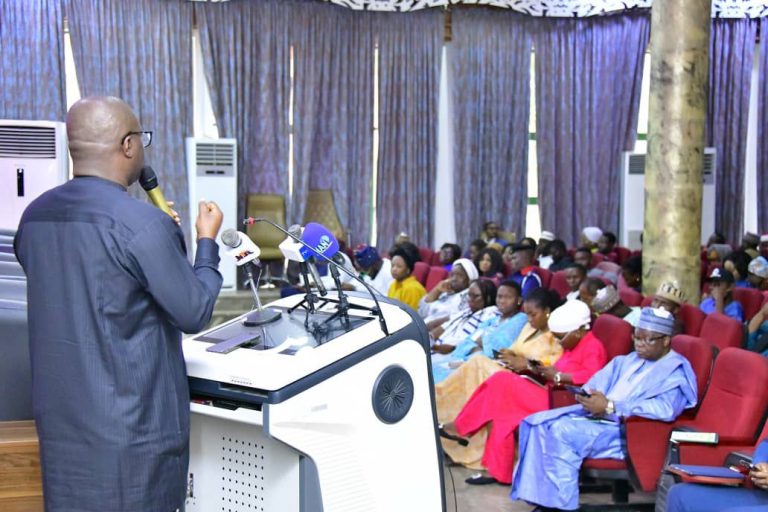By Ibironke Ariyo
Vanguard Against Drug Abuse (VGADA) has said Nigeria’s future must be secured through a decisive approach to the widespread problem of drug abuse.
The Managing Director of VGADA, Dr. Hope Omeiza, said this during the National Youth Conference to commemorate the International Day Against Drug Abuse and Illicit Trafficking on Friday in Abuja.
Omeiza said the current problem of drug abuse threatens to destroy the future of the youth, whom he described as the leaders of tomorrow.
The News Agency of Nigeria (NAN) reports that the theme of the conference is “Youth, Drugs, Mental Health and the Future of Nigeria”.
Omeiza, who also served as president of the conference, said the issue at hand was hurting many families in Nigeria.
According to him, it was with great sadness that I witnessed the torments of our young drug addicts while working under the auspices of my organization.
He said: “Nigeria’s youth are a formidable and productive force to be reckoned with, but drug abuse has begun to affect the productivity of a significant percentage of our youth.
“Nigeria’s population is about 70 percent young, or about 151 million people, which would make the country the largest youth population in the world.
“Unfortunately, more than 10 percent of these young people use hard drugs and suffer from substance use disorders.
“For this country to prosper, the young people who constitute its foundation must be healthy and mentally sound, but drug addiction leaves no stone unturned as it continues to harm the mental health of many of our young people.
“We must secure Nigeria’s future by decisively addressing the widespread problem of drug abuse which currently threatens to destroy the future of tomorrow’s leaders.
“I was a drug addict who couldn’t get anywhere, but today I can have some influence because I intervened in some way,” he said.
Omeiza said many young people want to be useful and whose intellectual property, if used correctly, will have a positive impact on the country.
“However, they cannot play their role because they are helpless and unable to resist the influence of drug addiction.
“Today we have a meeting of well-meaning government and agency leaders, top health experts, activists, and others.
“I hope that our spirited speech here today will make us understand the seriousness of the problem we face and help us find sensible and lasting solutions to this menace,” he said.
Speaking, the Chairman of the National Drug Law Enforcement Agency (NDLEA), Brigadier General Buba Marwa said the concept of drug addiction was neither new nor esoteric.
Marwa, represented by NDLEA Director of Media and Advocacy, Mr. Femi Babafemi, said drug abuse was prevalent among people aged 25 to 39 years.
He said the general picture of the situation was that 14.3 million Nigerians were addicted to drugs, mostly young people, in a region of at least eight million people.
He said the number may seem insignificant considering the huge population of over 206 million.
He added: “The gravity of the situation has not escaped Nigeria considering that about 15 or more African countries do not have populations of up to eight million.”
According to him, these are Togo, Mauritania, the Republic of Congo, Mauritius, Libya, and Liberia, to name a few.
“And around 28 European countries do not have eight million inhabitants. Look, in our own country, we have about the same number of young people abusing drugs.

“However, the NDLEA is working hard to make care, treatment, and rehabilitation available and accessible to young people,” he said.
In her speech, Titilope Gbadamosi, Senior Assistant to the President on Youth Initiatives (Implementation and Monitoring), said the issue of youth and drugs would continue to be featured more prominently in the presentation on youth initiatives.
Gbadamosi, however, praised the administration of President Bola Tinubu, saying, “What the Presidency and even the government of Nigeria is doing is tremendous.”
“The Ministry of Youth Development relies heavily on collaboration and we are doing everything we can to ensure that the menace of drug abuse in Nigeria reaches unprecedented levels.
“And we are not doing it alone. I mentioned earlier that we have a good relationship with the United Nations Office on Drugs and Crime (UNODC).
“And we are working with them on several initiatives that we will be announcing very soon. Our collective strength is also why we are here today,” he said.
Other actors present at the conference educated young people about the dangers of drug abuse, illicit drug use, and trafficking.



